- Home
- Rudy Rucker
As Above, So Below Page 20
As Above, So Below Read online
Page 20
He selected another eggshell and dabbed some black pigment onto his brush. It was the finest, richest of ivory blacks, made from burnt walrus tusk. Granvelle had told him to spare no expense in purchasing his supplies. His pittance of an artist’s fee was another story. Franckert would have laughed to hear how little Bruegel was being paid—not that Bruegel had seen Franckert since being seized by Granvelle. Franckert, Jerome Cock, and the rest of the Four Winds group had done their best to distance themselves from their friend, fearful lest they too be tarred with the black brush of sedition.
With quick little pecking motions, Bruegel painted the image of a wagon wheel onto the bottom of the corpse at the top of the pole, getting all the angles just right so that now the wheel seemed to be beneath the headless body, supporting it high above the observer’s point of view. He was pleased with how the pole had come out, he’d played a little trick with the perspective, drawing the pole’s bottom as if it leaned towards the viewer, and tilting the wheel at the top so that the pole seemed to lean away.
“Crooked,” he muttered to himself, thinking of the odd, reversed-looking gallows that he and de Vos had passed in the Alps. Executions were part of a Crooked World.
He noticed that his lips were dry and cracked. He’d been working solidly since dawn, without a stop, trying to finish off his two big new pictures. His tongue was sticking to the roof of his mouth. He set down his brush and drank from a pitcher of water.
The shock of the cold liquid sent a shiver of pain through his belly, but he’d learned to ignore the familiar ache. He let his eyes range over the painting of the army of skeletons, probing for any slight weakness and finding none. The Triumph of Death. It was a wonderful piece, some five feet by four feet in size, with a fine arabesque flow to the dun, figure-filled landscape, his best yet, rivaled only by the other big picture he’d been working on. It had been nice having two paintings in progress, that way there was always some spot dry enough to paint upon. His other picture was by a window, facing outwards to catch the sun. He’d added the last touches to that one an hour ago. Waf was lying in the sun on the floor beneath it. Seeing Bruegel’s break in concentration, Waf got up and walked over for some petting. Many days, Waf was the only soul whom Bruegel spoke with.
Last August, Cardinal Granvelle had taken Bruegel captive at the Landjuweel. Under the guard of Granvelle’s muscular priests, Bruegel had been given the opportunity to empty out his rooms above the Four Winds, with the priests examining each piece of paper to see if it might be some form of lampoon. This took the better part of a day. There were a lot of papers, and the priests were intent on rooting out every evidence of free thought, setting most of the papers aside to be burnt.
Throughout this ordeal, Jerome Cock, his fellow artists, and the coffee drinkers had stayed in the gallery below, gossiping among each other. One would have thought they barely knew Bruegel. The one and only brave soul who’d come to stand by Bruegel’s side was his spurned old friend Abraham Ortelius. Having heard of Bruegel’s trouble, Ortelius mounted the narrow Four Winds stairs unbidden, presented himself to the priests, and offered to keep in storage whatever possessions Bruegel couldn’t take to Mechelen with him. In the face of the prying questions the priests pressed, Ortelius had stood firm, describing himself as nothing more and nothing less than a devoted personal friend.
Shamed over his spitefulness, Bruegel had wept to hear it. He’d embraced Ortelius warmly, and it had soothed both their hearts. It made no sense for Bruegel to blame Ortelius for what Williblad had done with Anja, nor was it fair for Ortelius to harbor long resentments over a satirical engraving made partly in jest. The two swore to each other there could be no thought of ever falling out again.
Once the rooms had been emptied, the priests burned the bulk of Bruegel’s papers in the street, then carted him and Waf away. Ortelius had been the only one to wave good-bye.
That same night Granvelle had installed Bruegel in a second-floor room in the Regent Margaret’s provincial palace, a great red stone building right in the little walled town of Mechelen. And Bruegel had been set to work painting Hell.
For eight months now, Bruegel had lived and worked in the one large room. Its high windows looked out onto the market square, with a view of the stubby tower of the St. Rombold’s Cathedral. He was allowed to roam the palace and its courtyards, and occasionally the streets of Mechelen, but for all of fall and winter and spring he hadn’t been allowed out into the countryside beyond the town wall.
The Regent Margaret spent most of her time off in Brussels, running the affairs of state for her absent brother, King Philip, but once a month or so, she and her retinue would come to Mechelen for the hunting, and for special meetings with her inner circle of three, the so-called Consulta. The Consulta consisted of the Walloon Graaf Berlaymont, the viciously antiheretical Viglius van Aytta, and Cardinal Granvelle: Archbishop of Mechelen and Primate of the Low Lands.
The Regent Margaret and her ladies-in-waiting spoke only Italian. Bruegel had very little to do with them. This was fine with him; he’d disliked Margaret at first sight. She was tall, fruity-voiced, and imperious. She had a lantern jaw and something of a mustache. Bruegel gathered that her three main interests were collecting taxes, suppressing heresy, and killing foxes. It was hard to believe that so unwomanly a creature could be a wife; in any case her supposed husband was back in Parma.
For company other than Waf, Bruegel had the artists of Mechelen from whom he bought his supplies, the Flemish palace retainers and, best of all, occasional visits from Ortelius and from the Maykens. Nobody else had the courage to visit.
Mayken’s ostensible reason for coming to the palace was that she was designing a tapestry for the armory hall. But she seemed equally interested in visiting Bruegel. As for young Mayken, well, she enjoyed the day in the country. She seemed to think of him as a comical older companion, something like an uncle. Despite her continued casualness with him, Bruegel was beginning to feel the stirrings of romantic love. Young Mayken had reached a womanly age. Now and then, she’d look at him a certain way, with her lips red and full and kissable, and he’d nearly burst with longing. But other times she seemed so uninterested that Bruegel wondered whether his own feelings were real, or whether he only imagined them, driven on by his ambition for a place at the head of the Coecke workshop. Certainly life would be simpler if he and young Mayken were truly in love, and Bruegel sincerely wished for his life to become simple. Every hour wasted on emotional turmoil was an hour taken away from his time to paint.
In all honesty, his hopes for Mayken were a goodly part of why he’d ended his affair with Anja. Yes, Anja’s constant lying and unfaithfulness had been troubling. He’d gone so far as to map out his unhappiness as notches upon a stick. But the morning he’d actually broken the stick over his knee had been the same morning that old Mayken—stopping by the Four Winds on her way to the Landjuweel—had told Bruegel that he would not be allowed to court young Mayken at all if he continued to live in sin with a serving maid.
So he’d gotten rid of Anja, Anja had betrayed him to Granvelle, and the odd result was that, all of a sudden, his professional career was going very well. Yes, he was a prisoner in Margaret’s palace, but he was painting better than ever before.
One of the interesting features of this palace was its Wonder Chamber which held a remarkable collection of imperial artworks. Thirty years ago, the palace had been the home of Margaret’s great-aunt, another Habsburg Regent named Margaret, and this earlier Margaret had been famed for her art collection, including Jan van Eyck’s flabbergasting Arnolfini Wedding, which was still here on display. Bruegel had spent many hours studying the century-old masterpiece: the little Bruges couple in their room full of worldly goods, the man in a great black hat and the woman with her hand laid upon her rounded belly, the intricate chandelier in mathematically perfect perspective, and on the rear wall of the room a convex mirror with a tiny image of van Eyck and a friend, enshrined within his painting forever. As
it happened, Bruegel had brought his own convex mirror with him from his Antwerp studio; it was an ever-fruitful source of inspiration, a little horn of plenty.
It made him happy that his Fall of the Rebel Angels, the first picture he’d finished at the palace, was now on display in the Wonder Chamber with the van Eyck. Though Granvelle had been the one to commission and to pay (stingily) for this work, he’d left it on display here in the palace for the time being. The picture had been quite a sensation, and a few of the visiting nobles had approached Bruegel with requests that he paint their portraits, this despite the fact that The Fall of the Rebel Angels showed some hundred chimerical demons composed of fantastic mixtures of human and animal parts. Did the highborn really think that Bruegel would depict them any differently?
How ordinary were the intellects of most nobles. Though in the past Bruegel had sometimes resented his own lack of an inheritance, he was in some ways fortunate to have poverty goading him on. This said, he was indeed working much too hard. With no Anja to distract him, he worked from dawn to dusk every day.
Stepping back to his Triumph of Death, Bruegel turned his attention to a pair of lovers, a man playing the lute for a buxom woman in a revealing green gown. Behind them a skeleton was sawing at a fiddle. The woman seemed not to hear Death yet, but the red-haired lutist did; he was rolling back his eyes to look over his shoulder, visibly wondering at the source of the dissonant tones. A little spot of brightness was still needed. Bruegel added a fluffy feather to the woman’s hat, delicately stroking in its fronds with paint of white lead. He liked returning to this woman; she looked like Anja.
Ah, Anja. Alone here in this cold stone room, he often thought of the women he’d known. First there was Anja, then some other girls from the village, then the business with old Mayken, then two artist’s models he’d known in Naples, a cook’s assistant in Antwerp, and then Anja again. His merry playmate. Had he been right to break the stick? Yes. Anja had gone about with other men, had betrayed him to Granvelle, had done her best to get him hung. He’d never go back with her. It was preferable by far to direct his desires into the future, towards a vision of a pliant young Mayken, bursting with the juices of life.
Even so, Bruegel did still think of Anja sometimes, and not always in a vengeful or a lustful way. Come what may, she was part of his past life, and he was somewhat concerned about her welfare. Yesterday he’d gotten particularly disturbing news of her from Ortelius.
For his pretext to visit Bruegel in Mechelen, Ortelius had sold the court a set of his maps, and perforce he had to come several times to get them installed in the palace library. Each time his day’s short business was done, he came to Bruegel and the two of them went and sat in the Wonder Chamber, which Ortelius adored. The first time they’d been alone together, they went over all their apologies again, almost as if each of them were afraid the other might have returned to coldness. Ortelius expressed his remorse for having instructed his Helena to pass messages from Cheroo to Anja, and Bruegel for having harshly caricatured Ortelius in his Elck engraving. The affair with Anja would have ended in any case, and the engraving was but ink. It was enough. The wound was healed, and things were as comfortable as before.
Isolated as Bruegel was in Mechelen, it was quite an extraordinary delight to converse with his old friend. Yesterday Ortelius and Bruegel had comfortably chatted for several hours, mostly about Antwerp. It seemed that although Williblad Cheroo had initially found Anja a station in Fugger’s employ, she’d too insistently pressured Williblad for a lasting commitment, and the slippery Cheroo had ended her job. She was presently working as an artist’s model and living with Martin de Vos. Thinking about this made Bruegel terribly uneasy. Anja was, when all was said and done, something very like a sister. Modeling could be a risky business; some models ended up as trulls in the Street of Stews. And in a port town like Antwerp, loose women died young of the pox. De Vos was no prize, a drunkard with a violent temper—although he was a safer haven than none at all. Might he be induced to marry Anja? It would help Anja’s chances if she had a dowry. Bruegel sighed, trying to think of ways to provide her with one.
His own purse was exceedingly thin. And, confined as he was to the city walls of Mechelen, there was little he could immediately do for Anja. It wasn’t clear when he’d be allowed to move away from the provincial palace and get back into the great river of life. Granvelle was equivocal about how long Bruegel was supposed to work for him. Upon seeing Bruegel’s first painting, Granvelle had mentioned the possibility of Bruegel becoming a permanent court painter here, which seemed a grim fate indeed. Hopefully Margaret would have enough of Bruegel once she saw the new painting drying by the window. He smiled to himself, imagining her expression when she’d seen it. Margaret was expected here later today.
Shortly after Bruegel had finished The Fall of the Rebel Angels, Margaret’s interpreter, an epicene citizen of Brussels named Gustav Meerman, had told Bruegel that the Regent would like a portrait—with Margaret posed sitting upon her favorite horse, perhaps with a battle scene in the background. Bruegel had said that although he didn’t paint formal portraits, he’d make some kind of picture of Margaret. Being something of an aficionado of Bruegel’s work, Meerman had an inkling of how the picture might turn out, but he’d kept the negotiation going to see what would happen. A fee had in fact been agreed upon, although Bruegel misdoubted that Margaret would pay him even this small amount. The Habsburgs were notorious for failing to honor their debts. That had been all the more reason to paint the thing exactly as he saw fit.
There was a light footstep and a familiar figure appeared at Bruegel’s door. It was William the Prince of Orange, accompanied by his bodyguard, Grauer. William was a slight, graceful nobleman who sat on Margaret’s Council of State. He had short reddish hair and clean, manly features. Also known as William the Sly, he made a habit of coming up to Mechelen whenever Margaret did. William wasn’t part of Margaret’s inner Consulta, and he wasn’t really welcomed by her at all, but he too had a spare palace in Mechelen, and he liked to dog Margaret’s movements, the better to stay informed about what the rulers of the Low Lands were doing.
Prince William had the winning manner of a natural leader, and Bruegel had taken to him right away. It was no secret that William the Sly wanted the Habsburg rulers out of the Low Lands, indeed it was he who’d played the largest part in convincing Philip to withdraw the Spanish troops last year. William knew something about art—his family’s palace in Brussels held a magnificent collection—not that the Prince spent much time looking at it. William knew of Bruegel’s engravings and lampoons, and he relished the artist’s reputation for unconventional thought.
“Ho, Bruegel,” said William, looking at The Triumph of Death. “I’m back. What mad dreams you must have! You can wait in the hallway, Grauer.” Grauer was a hard-looking man with short gray hair and a cropped gray beard that blended seamlessly into the hair upon his head. His sharp blue eyes examined Bruegel and the room, and then he stepped outside and closed the door.
“When I work this hard, I sleep quite soundly,” said Bruegel. “Though, God knows, I grow weary of my daily descent into Hell. Care to have a seat and watch me paint, Prince William? I wouldn’t mind some company.”
“You’ve grown thin and wan,” said William. “There’s too much black bile and not enough blood in your humors. Work no more today! Come out to the polders with me. I’m going to fly my falcons. That’s the sole attraction of this turnip town. The game birds are more plentiful than near Brussels. We’ll bag some partridges, and we’ll take a heron from the clouds. You can use the fowl as studies for your monsters.”
“You can bring me outside the walls?” said Bruegel. “I’m your man. Can my hound come, too?”
“If he doesn’t spoil the hunt.”
“Oh, he’s well-behaved. Aren’t you, Waf?” Bruegel had become uncommonly fond of the dog. He washed the paint off himself, laid a wet cloth over the bits of shells with their egg-yolk-mixed pigm
ents, and found his cloak. Meanwhile William lounged on the cushions of Bruegel’s bed, looking around with noble ease. His gaze kept returning to The Triumph of Death.
“You devil!” exclaimed William just as they were ready to go. “I’ve been thinking that your painting reminds me of something and now I have it. The great tapestry in the palace dining hall! The battle scene with Margaret’s father!”
“The Victory of Charles V Against the Ottomans,” said Bruegel blandly. “A handsome composition. I suppose it’s possible that I was inspired by the handling of the figures in that landscape.”
“You devil.” William was one of the few nobles with the perception and wit to match his exalted station. Most of those who gathered at the palace were at the mental level of dogs.
Or perhaps not even dogs, thought Bruegel, smiling down at the prancing Waf, who sensed they were going for a walk. Bruegel himself could have barked with delight at the prospect.
William’s falconer was a brown-faced man named Bengt Bots from the village of Valkenswaard. He carried a large, hooded falcon perched on a heavy glove, while his son, also named Bengt, carried a slightly smaller bird. The hoods were like little leather helmets, with green billiard cloth sewn over the eye holes. Each helmet had a tuft of cock feathers on its crown, garnished with colored wool and bound with fine brass wire. The birds were held firmly in place on the falconers’ gloves by straps that hung from their legs; these straps were called jesses. There were little bells tied to the birds’ legs as well. Waf looked like he wanted to sniff at the falcons, but Bruegel scolded him back, and the dog understood.
“Where do you get your falcons?” Bruegel asked the falconer as they walked through the Mechelen streets. Since he had quite a bit of time to pass until Margaret’s arrival, William had decreed that today’s expedition would be on foot rather than on horseback.

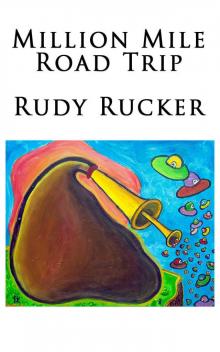 Million Mile Road Trip
Million Mile Road Trip Good Night, Moon
Good Night, Moon Transreal Trilogy: Secret of Life, White Light, Saucer Wisdom
Transreal Trilogy: Secret of Life, White Light, Saucer Wisdom Complete Stories
Complete Stories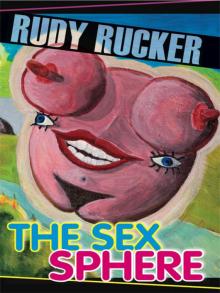 The Sex Sphere
The Sex Sphere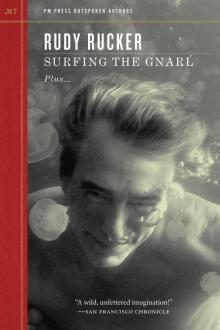 Surfing the Gnarl
Surfing the Gnarl Software
Software Mathematicians in Love
Mathematicians in Love Seek!: Selected Nonfiction
Seek!: Selected Nonfiction The Secret of Life
The Secret of Life The Hacker and the Ants
The Hacker and the Ants Postsingular
Postsingular Spaceland
Spaceland Transreal Cyberpunk
Transreal Cyberpunk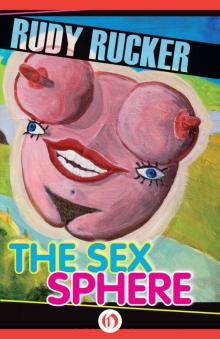 Sex Sphere
Sex Sphere Spacetime Donuts
Spacetime Donuts Freeware
Freeware The Ware Tetralogy
The Ware Tetralogy Frek and the Elixir
Frek and the Elixir Junk DNA
Junk DNA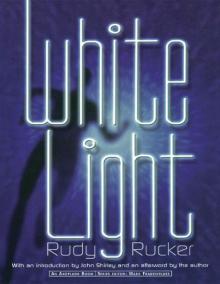 White Light (Axoplasm Books)
White Light (Axoplasm Books)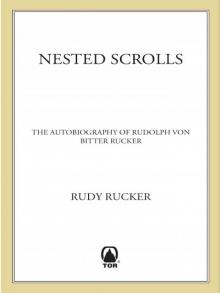 Nested Scrolls
Nested Scrolls Inside Out
Inside Out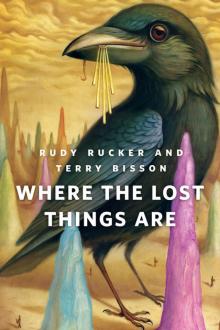 Where the Lost Things Are
Where the Lost Things Are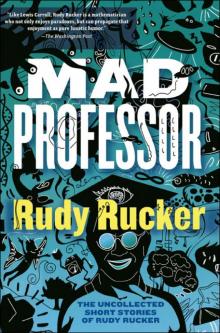 Mad Professor
Mad Professor As Above, So Below
As Above, So Below Realware
Realware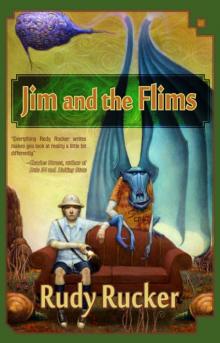 Jim and the Flims
Jim and the Flims Master of Space and Time
Master of Space and Time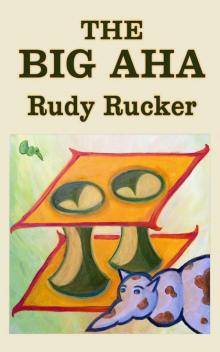 The Big Aha
The Big Aha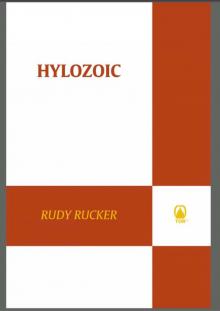 Hylozoic
Hylozoic